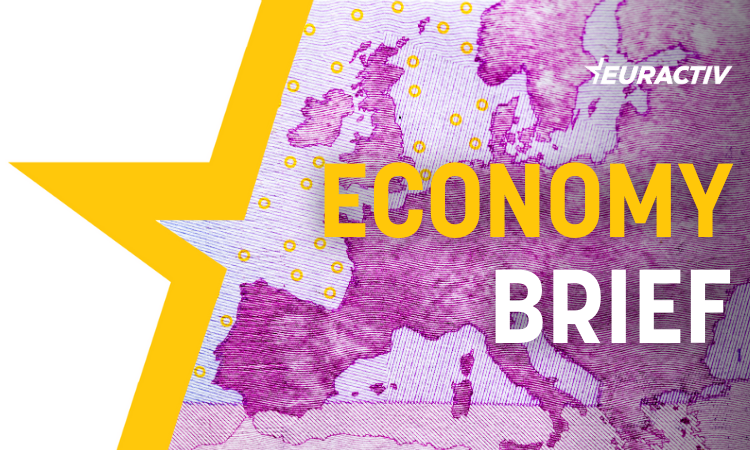
The influential Brussels think-tank Bruegel has sent a ‘memo’ to Commission President-designate, Ursula von der Leyen, warning her of over-burdening consumers during her likely second term.
Few economic think tanks get as much attention from decision-makers as Bruegel – one of the longest-standing non-affiliated Brussels-based research centres, the views the group shares tend to make their way into EU policy.
The think-tank sent a “President memo” – authored by director Jeromin Zettelmeyer and senior fellows Maria Demertzis and André Sapir – to von der Leyen on Thursday 4 July, outlining its ideas on the tasks awaiting her in the upcoming mandate.
“The best way to understand this is the trade-offs,” Demertzis, also a professor of economic policy at the European University Institute, told Euractiv.
The first trade-off the Commission will face is on the need for money: re-armament, climate protection, digital infrastructure, and Ukraine reconstruction.
“But fiscal space is tight, and raising own resources or agreeing to new EU borrowing will be difficult and divisive,” the experts note.
The second trade-off is on the need to accelerate decarbonisation, at a time when opposition is heating up against what is seen as too-pervasive regulation .
“We know that decarbonisation is probably going to hamper growth, at least in the short run,” said Demertzis, “but we have to do it anyway.”
More specifically, the experts warn in their memo that “higher and broader carbon pricing will further strain social cohesion and fan polarisation around climate action,”– with the EU’s Emissions Trading Scheme 2 (ETS2) in mind, the EU’s new carbon price for heating and driving, which will start hitting European consumers in 2027.
Thirdly, they expect industrial policy to play an ever bigger role, which they say is required due to the need for economic security and an accelerated green transition – but it may hurt growth and upset international trading partners.
This, again, could land on the shoulders of consumers, said Demertzis. “If we follow industrial policy, the consumer pays a higher price than normal,” she said, “because industrial policy means that we are bypassing what is competitive in the economy.”
Newly-imposed tariffs on China-made EVs might be a case in point, which in an optimistic scenario will not increase consumer prices that much, but in the worst case could make green tech more expensive and reduce consumer choice.
“On top of it, we’re going to tax the consumer as well, because how can you pay all of this without tax money?” she added.
For as sensitive the policy objectives – defence, climate protection, and an industrial future – may be, a even more thorny task for von der Leyen will be to distribute costs fairly.
“The EU cannot allow for the cost to fall disproportionately on some segments of society, particularly the weak ones,” said Demertzis.
Though conceding “there is a good reason why consumers need to adapt their behaviour,” the Bruegel fellow argued “somebody [will need] to sit around the table and draw this up.”
“So if we’re going to do the ETS2, then what else are we going to do that is not going to necessarily fall on the consumer?” she asked.
Which brings us back to the point on what “own resources” the bloc can count on.
“Identifying common resources to pool common goals is the right way of doing this,” she said. That would mean identifying “what are the strategic investments for Europe for the next five years, and financing them at the European level.”
Her fear is that – if left alone with the targets – national governments could implement policies in a way that is problematic for poorer households. But “if we pool things together in Europe, we can actually do this in a much more equitable way, because we will be directing it exactly where it needs to go.”
While the emphasis on the need for continued EU investment tackling upcoming economic challenges echoes calls from a broad range of stakeholders, the recommendation of pooling together additional funds, could face intense opposition during a mandate dominated by centre-right politics.
What direction will the Commission go? A first signal might come from former European Central Bank chief Mario Draghi, who is expected to present policy recommendations over summer that could provide a close representation of what the EU executive will prioritise over the next five years.
Economy News Weekly Roundup
German pressure on EU-China trade outcomes piles up as Commission tariffs kick in. Pressure from Germany to reconsider trade tariffs on China-made electric cars is set to intensify in the coming weeks as member states start negotiating their official stance on the issue, after the Commission confirmed on Thursday (4 July) that provisional duties kick in from Friday. The announcement marks the start of the second phase of the EU’s ‘trade defence’ procedure, which entails negotiations among member states to determine the final outcome of the legislative process. Read more.
China urges EU to ‘meet halfway’ on electric vehicle dispute. China’s commerce ministry urged the European Union to “meet halfway” to resolve the ongoing trade dispute over electric vehicles (EVs) after the EU Commission confirmed preliminary tariffs on Thursday (4 July) – prompting even harsher criticism from Chinese businesses. In a statement issued after the EU executive confirmed provisional tariffs on Thursday, the ministry stressed its “strong opposition” to the decision and called for the feud to be “resolved through dialogue and consultation”. Read more.
Labour victory unlikely to restore pre-Brexit economic ties, experts say. The Labour victory in the UK general election on Thursday (4 July) could foster greater levels of trust and closer economic ties with the EU – but is unlikely to restore pre-Brexit integration, as policy divergence looks set to remain a longer-term reality, experts say. The party’s manifesto pledges to “improve the UK’s trade and investment relationship with the EU by tearing down unnecessary barriers to trade.” Much like the Conservative party, however, Labour has categorically ruled out the UK’s re-entry into the single market or customs union, and any deal that would allow citizens to move freely within the EU. Read more.
Centre-right EPP wants to slash reporting, 70% of EU spending for competitiveness. The European Parliament majority group EPP wants the next Commission to devolve more than two-thirds of EU spending to boost the bloc’s economic competitiveness, according to a draft work plan seen by Euractiv, set to be adopted during the group’s convention in Portugal, which will wrap up today. The draft “5-point plan for a strong Europe” follows much of the centre-right’s EU election manifesto but specifies some of its core demands in more detail. Read more.
EU Socialists double down on social guarantees and public support in draft action plan. Europe’s Socialists and Democrats double down on their calls for social guarantees and solid public support to tackle ongoing economic challenges, proposing in their draft action plan a batch of additional revenue streams for the bloc’s funding resources. The overarching priorities of the S&D group in terms of economic policy contrast sharply with those of centre-right EPP. The S&D will put a strong emphasis on guaranteeing a continued role for EU-level public funding to tackle ongoing economic challenges. Read more.
EU trade chief quells business fears of heightened economic protectionism. The European Union’s growing emphasis on economic security will not undermine the fundamental openness of Europe’s economy, the EU’s top trade official said on Tuesday (2 July) to reassure the business community. Speaking at an event organised by Brussels-based lobby group BusinessEurope, Trade Commissioner Valdis Dombrovskis said that the EU executive’s recent push to coordinate export controls and enhance screenings of inbound foreign direct investment, among other “protective” measures, does not mean that Europe is sliding towards full-blown economic protectionism. Read more.
EU rebuffs threat of Beijing probe, stands by foreign subsidies law. The European Commission has dismissed China’s announcement that it could launch an investigation into the EU executive’s alleged misuse of anti-subsidy legislation, saying the framework fully respects business confidentiality rules. The Commission spokesperson for competition, Lea Zuber, told Euractiv on Monday (1 July) that the EU will continue to make “full use” of its legal and investigative mechanisms to ensure that non-European companies don’t unfairly benefit from state subsidies. Read more.
Industry cannot rely on negative emissions for 2039 climate target, experts say. Industry should not rely on negative emissions to compensate for the ending of new EU Emission Trading Scheme (ETS) allowances from 2039, Felix Matthes of German Öko Institute told Euractiv. “These will be super small amounts,” he said, pointing out that “it will no longer be possible to operate a conventional steelworks or fossil-fueled power plant,” as of 2039, even if negative emissions are included into the ETS. The European Commission will have to present options to include negative emissions into the ETS by 2026. Read more.
[Edited by Anna Brunetti/Rajnish Singh]







